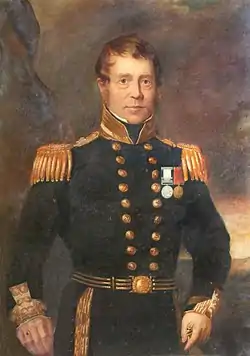John Carter (Royal Navy officer)
Admiral John Carter (1785 – 2 April 1863[1]) son of Thomas Carter and Catherine Butler of Castlemartin Co Kildare and grandson of Henry Boyle Carter, was an officer of the Royal Navy, who saw service during the French Revolutionary and Napoleonic Wars.
John Carter | |
|---|---|
 | |
| Born | 1785 Castle Martin, Ireland |
| Died | 2 April 1863 (aged 77–78) Devonport, England |
| Allegiance | United Kingdom of Great Britain and Ireland |
| Service/ | Royal Navy |
| Years of service | 1798–1863 |
| Rank | Admiral |
| Battles/wars | Battle of Trafalgar |
| Relations | |
Carter joined the Navy in January 1798, serving aboard the 28-gun HMS Brilliant in the Mediterranean. In July Brilliant had a narrow escape from two French 44-gun frigates off Santa Cruz.[1] He then moved aboard HMS Penelope as a midshipman, and took part in the blockade of Malta.[2] On 30 March 1800 Penelope was one of the ships that intercepted and aided in the capture of the French 84-gun Guillaume Tell.[2] He then took part in the campaign in Egypt, followed by service in boat actions off the French and Genoese coasts.[1]
Carter served for a time aboard HMS Victory under Vice-Admiral Lord Nelson, and in February 1805 Nelson transferred him into an acting-lieutenancy aboard the 74-gun HMS Leviathan.[1] Admiral Lord Nelson awarded him with his sword and telescope for distinguished service under his command.[3] Carter then took part in the pursuit of the combined Franco-Spanish fleet to the West Indies during the Trafalgar Campaign.[1] He returned with the British fleet and took part in the Battle of Trafalgar, where his service involved securing the prisoners and destroying the prizes.[1] He was back in the West Indies by late 1806, where he navigated the badly leaking HMS Cerf back to Britain, fothering her hull with sails and with the pumps manned all throughout the voyage.[1] He captured the 14-gun Emille off St Valery in February 1814.[4] He was promoted to post-captain on 7 December 1815, and went on to become superintendent of the Royal Hospital Haslar after the end of the Napoleonic Wars.[4]
Carter was Superintendent of the Royal Clarence Victualling Yard between December 1841 and December 1846, and was promoted to rear-admiral on reserved half-pay on 8 April 1851. He was promoted to vice-admiral on 9 July 1857 and admiral on 4 October 1862.[4] Admiral John Carter died on 2 April 1863 at Devonport.[4]
See also
References
- The Gentleman's Magazine. Vol. 214. p. 802.
- Beatson. Beatson's Political Index. p. 313.
- O'Byrne's naval history
- The Gentleman's Magazine. Vol. 214. p. 803.
Further reading
- O'Byrne, William Richard (1849). . . John Murray – via Wikisource.
- Carter-Campbell of Possil
- The Trafalgar roll p. 192., by Robert Holden Mackenzie, U. S. Naval Institute Press, Annapolis, MD, 1989. ISBN 0-87021-990-1.
- Beatson, Robert (1851). Beatson's Political index modernised. The book of dignities: containing rolls of the official personages of the British empire, together with the sovereigns of Europe, the peerage of England and of Great Britain; and numerous other lists. Longman, Brown, Green, and Longmans.
- The Gentleman's Magazine. Vol. 214. John Henry and James Parker. 1863.